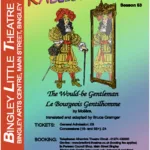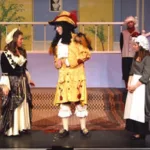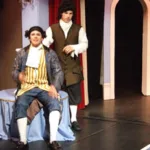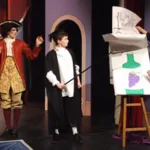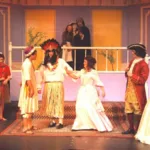Season 63 Kaleidoscope – The Would-Be Gentleman by Moliere (Translated and adapted by Bruce Grainger)
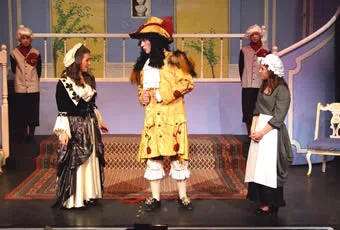
Directed by
Cast
Music Pupil – MARTHA WILSON
Music Master – MATTHEW WESTERN
Dancing Master – DANIEL WILLOX
Footmen – ETHAN WOODHOUSE-KENT, JOE MCGRATH
Monsieur Jourdain – JOSH BREEZE
Gavote Dancers – KATHARINE BRINKWORTH, CHLOE DUKES, HAZEL COOPER, LAUREN SPENCER
Singers – BETH WHITEHOUSE, MADELEINE EGLIN, IMOGEN HODDY
Fencing Master – JACOB SIMPSON
Philosopher – HENRY EGLIN
Elocutionist – CATHERINE HARIS
Tailor – JACK SMIDDY
Tailor’s Apprentices – LAWRENCE DAVIS, LUCIEN HERON, JOSH LONGBOTTOM, JILL GAUNT, MATTHEW PERKINS, LAUREN SHIMBLES, EMILY WHITEHOUSE, EILISH FOY
Nicole – CHARLIE REYNARD
Madame Jordain – LYNDSEY STARR
Dorante – JOSH PACKHAM
Cleonte – TOM BEAN
Covielle – BRAD JUDGE
Lucile – TANYA GILLOW
Dorimene – GRACE PARTINGTON
Cooks & Bungee’s – ALEX PARNELL
Bungee – TOM STREATFIELD
Attendants – SHANNON LINEY
Synopsis
The foolish but wealthy Monsieur Jourdain has but one aim in life, to rise above his middle-class background so that he is accepted as an aristocratic gentleman. To this end he orders splendid new clothes and applies himself to learning the gentlemanly arts of fencing, dancing, music and philosophy. In doing so, he makes an utter fool of himself, despite the efforts of his sensible wife. Meanwhile, Dorante, a cash-strapped nobleman sponges on him, while flattering his snobbery by promising to introduce him to a wealthy, widowed Marchioness. Jourdain’s dreams of social-climbing mount higher as he aspires to his daughter, Lucille, marrying a nobleman instead of Cléonte, whom she loves. Cléonte and his valet Covielle trick Jourdain into believing that Lucille is being courted by foreign royalty and that he himself is to be ennobled at a special ceremony. It is this ridiculous ceremony which bring the play to its hilarious climax.
Directors Notes
Why perform a translation of a seventeenth century French play? Well there can be many reasons, but we chose this play because it is very entertaining. It has a reasonable number of speaking parts including some delightful cameo roles, and we could see ways in which it could be adapted to involve still more people. Besides, we had a good modern translation and we always welcome a challenge.
Although the period in which it was written is quite close to that of last year’s play, The Beggar’s Opera, the structure is very different. The Acts of the play, five in all, are separated by entr’acte dances which spring from the action; in the original these dances would have been ballets. We have tried to retain the flamboyance of the period through the set, costume and, where appropriate, the language. We hope, however, that the blend of accents and the more modern colloquial speech will emphasise the timelessness of the underlying theme and humour. The larger than life characters reveal attitudes we can recognise today. There will always be those who put on airs, those who seek to take advantage of them and those who sponge on the well-to-do. Someone pretentious but gullible will inevitably be taken for a ride.
Enjoy the absurdities of the plot and appreciate the underlying truths!


